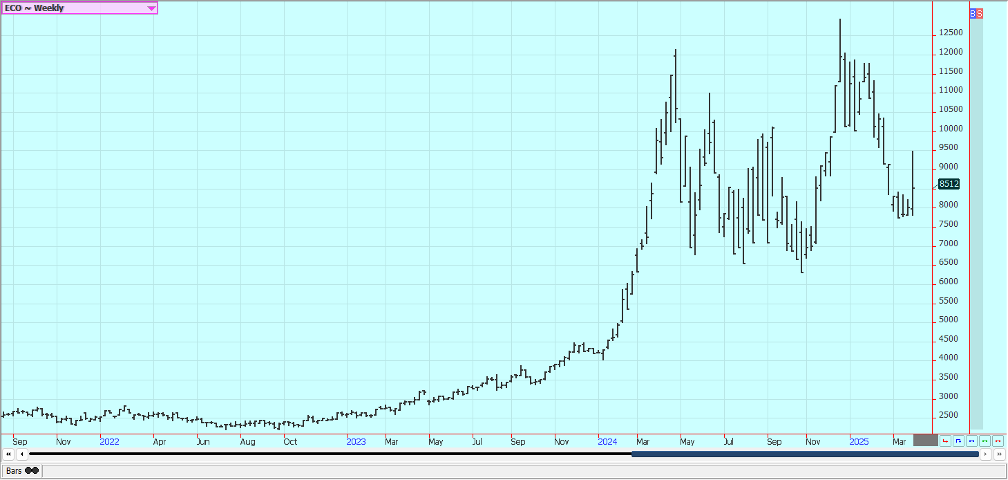Jack Scoville
Jack Scoville is an often quoted market analyst in the grain and soft commodities sectors. You will find his commentary throughout the Reuters, Wall Street Journal, Dow Jones, Bloomberg, and Barron's publications. Contact Mr. Scoville at (312) 264-4322
Translate





Weekly Ag Markets Update – 04/07/2025
Wheat: All three markets closed lower last week in response to the tariffs that President Trump imposed yesterday afternoon. Speculators were already short and took the initial move lower as a chance to cover some of those positions. The selling returned on Friday as the market assessed the potential damage to the world and US economies and the potential for more lost business. The tariffs will cost producers more for inputs and should damage upside price potential. Dry outlooks for the Great Plains and Black Sea regions are still the main feature but rains were seen in West Texas last week. Growing conditions are dry around the world and in the US Great Plains and Winter Wheat crops are emerging from dormancy. Overall demand has been weak.
Weekly Chicago Soft Red Winter Wheat Futures
Weekly Chicago Hard Red Winter Wheat Futures
Weekly Minneapolis Hard Red Spring Wheat Futures
Corn: Corn closed higher last week as the market reacted to the announcement of the new Trump tariffs. There was renewed talk that tariffs could damage agricultural exports starting now as Trump imposed a blanket of tariffs on all countries and big tariffs on some countries such as China. Mexico and Canada were excused from this round of tariffs but already have tariffs imposed on them. The tariffs have become an off again on again feature of the government and no one knows what to do at this time. And that news appears to have allowed Corn to hold firm It is dry in growing areas in western US, but most of the Midwest has had precipitation lately and eastern areas are getting too wet. Oats were lower and the trends are turning down again.
Weekly Corn Futures
Weekly Oats Futures
Soybeans and Soybean Meal: Soybeans closed lower last week as the market got new11of the new tariffs imposed by President Trump. There was increasing talk of new tariffs and the damage they could do to US agriculture and especially Soybeans sales to China and Europe. China retaliated with tariffs of their own of 34% and caused renewed selling on Friday. It is now possible for Soybeans to make a low and rally at least a little this week. South American production looks strong although slightly less than previous estimates, with Brazil expected to produce 170 million tons and Argentina producing 49 million tons or a little less. Consumer confidence is down and there are increasing worries that the US could be headed into a recession that could hurt domestic demand. The Brazil Soybeans harvest is now estimated to be more than 85% complete.
Weekly Chicago Soybeans Futures
Weekly Chicago Soybean Meal Futures
Rice: Rice closed lower last week, but the losses were moderate and were only partly tied to news that the Trump tariffs are now here and operating. Mexico was exempted from new tariffs but still must deal with tariffs already imposed on their goods. Prices remain cheap and could threaten the planted area as it will cost more to produce Rice than it is getting in the market right now. Export sales have not been strong, and domestic demand is there but is not strong enough right now to bid prices any higher. Milling quality of the Rice remains below industry standards and it takes more Rough Rice to create the grain for sale to stores and exporters.
Weekly Chicago Rice Futures
Palm Oil and Vegetable Oils: Palm Oil futures were lower last week in reaction to the Trump tariffs announcement mage Wednesday afternoon that proved bigger than expected. There is talk of reduced supplies in the market due to extreme weather that caused fields to flood among other things. Demand was improved in March and was weaker than expected for February. Chart trends are mixed. Canola was mixed yesterday as traders reacted to the announcement of the new Trump tariffs on Canadian goods and others in the world. Canadian goods were exempted from the new round of tariffs but still must deal with the tariffs previously imposed by the US.
Weekly Malaysian Palm Oil Futures
Weekly Chicago Soybean Oil Futures
Weekly Canola Futures
Cotton: Cotton was sharply lower last week in response to the Trump tariffs that threaten to greatly increase the costs of imports from China and Vietnam among other things. Both are major importers of US Cotton and sell goods made with that Cotton back to the US, so that trade could be lost. Some rain was reported in west Texas last week to help ease drought concerns and potential supply problems.
Weekly US Cotton Futures
Frozen Concentrated Orange Juice and Citrus: FCOJ closed lower last week as the selling continued, this time in response to the Trump tariff proposals that should have supported FCOJ for domestic consumption. It didn’t because there are fears of a worlwide recession developing. The down trend in prices remains intact. The short term supply scenario remains tight but is now a little loose. The reduced Florida production appears to be mostly at the expense of the greening disease and some extreme weather seen in the last couple of years. There are no weather concerns to speak of for Brazil or Florida right now although Brazil could turn hot and dry.
Weekly FCOJ Futures
Coffee: Both markets closed lower last week and near the lows of the week in response to the Trump tariff announcements. Coffee is being tariffed even though the US does not produce any except for a small amount grown in Hawaii. Vietnam products are being tariffed to a significant degree and so are those from Brazil. Traders were taking a little price from the sell side of the market to cut the damage from the tariffs being enforced and in hopes to maintain demand strength. The lack of offers from Brazil along with reduced production and offers from Vietnam continue. The Vietnam harvest is over, but producers are holding back on some beans and are hoping for higher prices. Hot and dry weather is in the forecast for Brazil longer term.
Weekly New York Arabica Coffee Futures
Weekly London Robusta Coffee Futures
Sugar: New York was lower and London was higher last week, but saw selling in both market late in the week in response to the Trump tariff news. The tariffs threaten to cause a worldwide recession that could hurt demand here in the US and in other countries in the world. There were reports of some scattered showers in center south Brazil and forecasts for more showers in the next couple of weeks and reports that India will have comfortable beginning stocks to help cushion the blow from reduced production for the coming year. Indian production is expected to be a disappointment this year. Ideas of decreasing Brazil and Asian production are still around. Center-south Brazil, India, and Thailand all have reduced production potential due to weather.
Weekly New York World Raw Sugar Futures
Weekly London White Sugar Futures
Cocoa: New York and London closed higher last week despite the Trump tariff moves. Trends are still generally up in these markets, but demand ideas got hurt as the tariffs will increase costs to US buyers of chocolates. Cocoa imports are now subject to a 10% tariff at minimum. Ideas are that a strong crop is expected and the ICCO recently raised its forecast of production for the coming year. Ivory Coast port arrivals and Ghana arrivals are expected to fade but have held strong so far. There is talk that production will be short of demand for the fourth year in a row, and Ivory coast has already said that offers into the world market will be less this year. Chart trends are mixed to down in both markets on the daily charts. Producers in Ghana and in Ivory Coast have been fighting against too little rain that has reduced yields.
Weekly New York Cocoa Futures
Weekly London Cocoa Futures

Questions? Ask Jack Scoville today at 312-264-4322